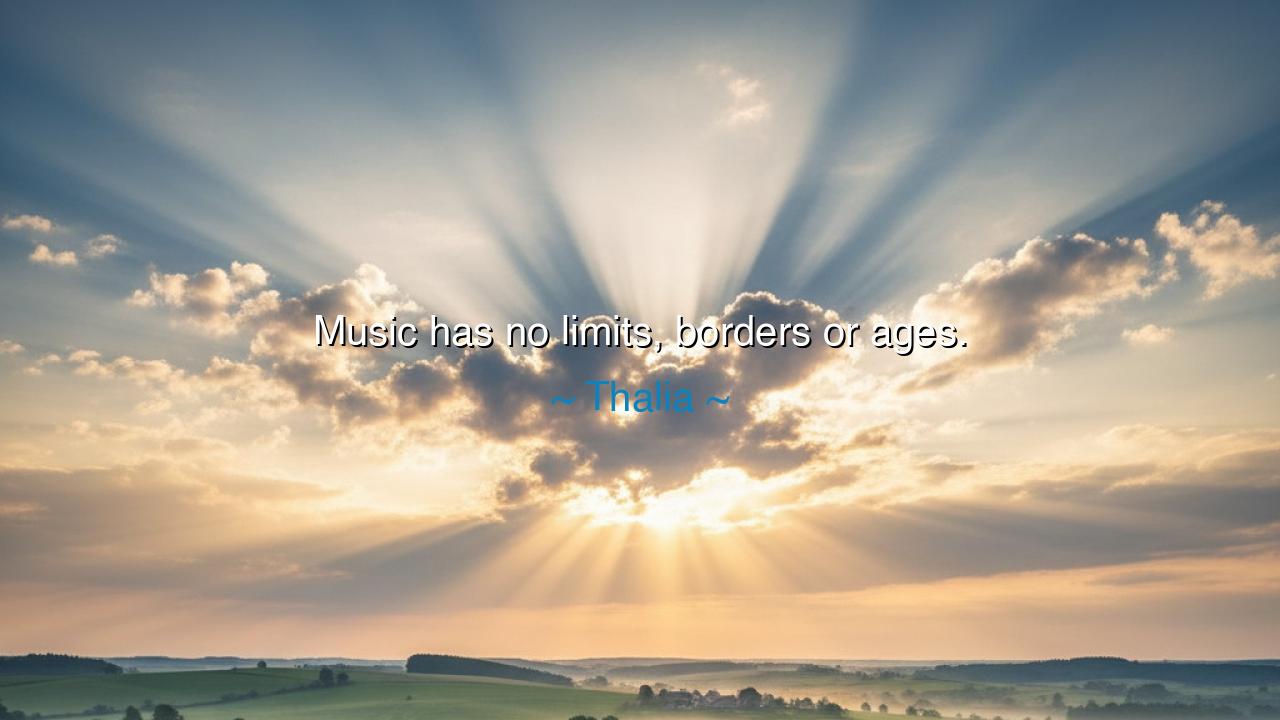
Music has no limits, borders or ages.






The words of Thalía—“Music has no limits, borders, or ages.”—echo like the song of eternity itself, a reminder that melody is the language of the soul, unbound by the chains that divide mankind. In this declaration is the recognition that while tongues differ and nations rise and fall, music alone flows freely, passing through walls, leaping across oceans, and touching every heart, whether young or old, rich or poor, native or stranger. Music belongs to no one people—it belongs to all.
From the earliest days of humanity, before the written word, there was song. The tribes of Africa drummed upon the earth, the shepherds of Greece played flutes beneath the stars, the monks of medieval Europe chanted hymns that still stir the heart. Each culture gave birth to its own melodies, yet the spirit that animated them was the same. Even when divided by borders, people found that they could understand one another through rhythm and tone. This is why Thalía speaks with such conviction: for the soul needs no translation to recognize the beauty of music.
History offers us many examples of this truth. During the Cold War, when nations were split by ideology and suspicion, music became a bridge. The jazz tours sponsored by America carried the sound of freedom into lands where voices were hushed. Soviet audiences, though trained to distrust the West, could not help but tap their feet and sway to the same rhythms. Walls of politics stood tall, but music slipped past them, whispering to the human heart a message of unity.
Consider also the legacy of Beethoven. Deaf in his later years, unable to hear the notes himself, he composed symphonies that continue to move generations. His Ninth Symphony, with its “Ode to Joy,” became not just the anthem of a continent but the hymn of humanity. Sung in many languages, in cathedrals and in stadiums, its message of brotherhood ignores ages, transcends borders, and defies the limits of time. Truly, this is the power Thalía speaks of—the immortality of music.
The meaning of her words is this: music awakens what is deepest in us, the part untouched by division. A child dances instinctively to rhythm before they can speak. An elder, weary with years, may find tears flowing unbidden when an old melody rises. Between the newborn and the dying, between the peasant and the king, music calls forth the same fire. It speaks to the eternal essence within, where there is no age, no nation, only the beating of the human heart.
The lesson for us is profound: we must learn to listen to one another through the gift of music. When words fail, when arguments grow bitter, when barriers seem impossible, let song be the meeting place. Share in the rhythms of another culture. Allow yourself to be moved by melodies not your own. For in doing so, you discover that beneath our many differences, we are one chorus, one dance, one universal song.
Practically, this means opening our hearts to music wherever it may be found. Do not confine yourself to the familiar, but explore the voices of the world—the tabla of India, the drums of Africa, the ballads of Spain, the hymns of cathedrals, the electric anthems of the modern age. Share songs with children and with elders alike, so that they may know joy and belonging. And above all, let your own life carry rhythm—live with harmony, with cadence, with a song that inspires others.
Thus let Thalía’s words endure: “Music has no limits, borders, or ages.” It is the eternal inheritance of humankind, the one gift that unites the nations and outlives empires. Live by this truth, and you will find that wherever you go, you are never a stranger, for the song of the heart will always recognize its own.






AAdministratorAdministrator
Welcome, honored guests. Please leave a comment, we will respond soon